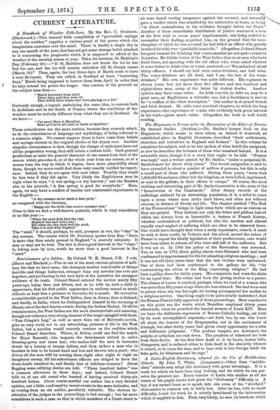The Huguenots in France after the Revocation of the Edict
of Nantes. By Samuel Smiles. (Strahan.)—Mr. Smiles's former book on the Huguenots, which seems to have taken, as indeed it deserved, an established place in English literature, described "their settlements, churches, and industries in England and Ireland." In this volume he completes his subject, and as he has spoken of what befell the emigrant, so now he describes the fortunes of those who remained behind. It is a miserable story, though it is a story that ought to be told. "France was kept," says a writer quoted by Mr. Smiles, "under a perpetual St. Bartholomew for about sixty years." The forced emigration is said to have extended to about a quarter of million of persons, but this is only a small part of those who suffered. During these years, "more than 1,000,000 Frenchmen either left the kingdom, or were killed, imprisoned, or sent to the galleys, in their efforts to escape." Of course, the most striking and interesting part of Mr. Smiles's narrative is the story of the "Insurrection of the Camisards." After dreary records of the sufferings endured by an unresisting population, it is a relief to come upon a scene where men strike hard blows, and often not without success, in defence of liberty and life. The chapter entitled "The End of the Persecutions" brings to light some facts which are as curious as they are painful. They indicate not only the bitter and pitiless hatred which has always been so lamentable a feature of French history, whether ecclesiastical or political, but also the careless and almost equally cruel neglect of suffering which are often to be observed there. One would have thought that when a tardy repentance, roused, it must be said, to their credit, by Voltaire and his school, moved the rulers of France to repeal the bloody legislation of their predecessors, care would have been taken to release all who were still left of the sufferers. But it was not so. In 1764 the policy of the Revocation was reversed. Yet, as late as 1772, three galley-slaves were liberated who had been condemned to imprisonment for life for attending religious meetings ; and it was not till three years later that the last victims were unchained. One of them had been condemned to the galleys for life, "for contravening the edicts of the King concerning religion." He had been a galley-slave for thirty years. His companion had worn the chain for an equal time. His crime had been the giving shelter to a pastor. The climax of horror is reached, perhaps, when we read of a woman who was more than fifty years of age when she was released. She had been sent to prison when she was but eight, for having accompanied her mother to a religious service. One thing ought to be quite clearly understood, that the Roman Church fully approved of those proceedings. Most conclusive on this point are the words which Massillon employed thirty years afterwards, when he preached the funeral sermon of Louis XIV. Here we have the deliberate expression of Roman Catholic feeling, set forth by its most accomplished exponent,—set forth too, by one who knew all about the horrors of the Dragonnados, not in the excitement of triumph, but after thirty years had given every opportunity for a calm and deliberate judgment. "The profane temples are destroyed, the pulpits of seduction are cast down. The prophets of falsehood are torn from their flocks. At the first blow dealt to it by Louis, heresy falls, disappears, and is reduced either to hide itself in the obscurity whence it issued, or to cross the seas, and to bear with it into foreign lands its false gods, its bitterness and its rage."






























 Previous page
Previous page